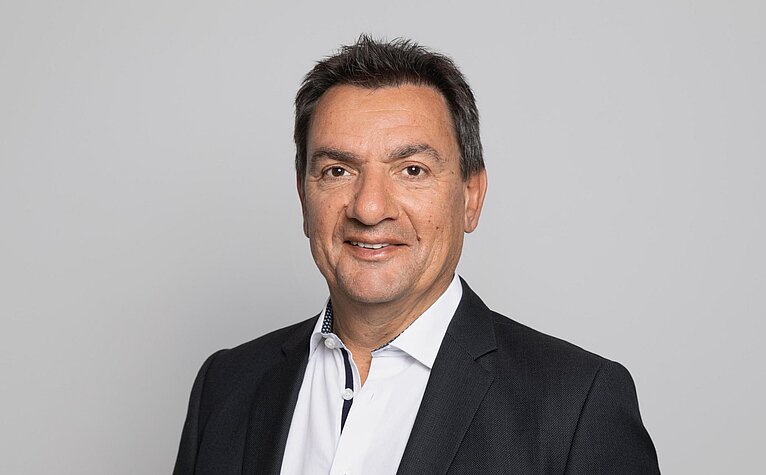 (c) Beckhoff Automation
(c) Beckhoff Automation
- Location advantages
- Innovation and digitalisation
- Success story
- News
“I can make a strong case for Austria’s universities”
09. September 2025As a global technology company in industrial automation headquartered in North Rhine-Westphalia, Germany, Beckhoff Automation employs 5,300 staff in 75 countries and generates annual revenue of more than €1bn. Beckhoff has been active in Austria since 1997 and is steadily expanding its sites, most recently in Bürs, Vorarlberg.
Interview with Armin Pehlivan, Managing Director, Beckhoff Automation GmbH
With ATRO, Beckhoff Beckhoff ()has developed a new modular industrial-robot system in Vienna and recently presented it to the public. What can ATRO do, and what advantages does it offer your customers?
ATRO is a mechanical modular system that lets you build, among other things, a robot—a big mechanical Lego set for engineers. This means you can combine the modules as you wish. The benefit is that customers no longer have to buy a standard robot and build their application around it. Instead, they start from the application—the task at hand— and design the robot specifically for that task, adapting the mechanics so it fits optimally.
Beckhoff has been active in Austria since 1997. From your headquarters in Vorarlberg you have built five further branches across the country in the meantime. What does your business look like here, and what does Beckhoff value in Austria?
We sell our customers a control solution and train them to use it as effectively as possible. Every branch has a training centre. Introductory training typically lasts a week; after that, customers are familiar with the key topics, from motion and kinematics to safety engineering, visualisation and metrology. They then continue to receive support, up to and including programming, also from our more than 100 Beckhoff Solution Partners across Austria.
Beckhoff is currently building a new site at its Austrian headquarters in Bürs, investing €20m. When will it be completed, and what are your plans for it?
We’re creating a central hub for all employees in Bürs, where order processing and administration are located. The site will provide space for several dozen staff. We’re also diversifying the training offer. It’s shifting towards highly specific courses, focused on a single topic rather than spread broadly across customers, and we’re accommodating that here. It will be one of the most modern training centres in the Beckhoff community. The new building will also host large events. We’ll move in December 2025 and plan to be operational in the new building from 1 January 2026. The official opening will take place sometime in the spring.
In Vienna you opened a robotics competence centre in 2022, also to expand your training offering. In your ‘Summer Schools’ you train not only customers but also school pupils, university students and apprentices, free of charge, in a five-day TwinCAT course to become PLC programmers. Is that one way of attracting talent to Beckhoff? What else do you do to recruit and retain the right people?
Companies have to be proactive to attract young talent. Our training rooms are free during the holidays, so we offer three different courses that go down well with HTL pupils (upper-secondary technical colleges), university of applied sciences students and university students. Over the past six years an average of more than 100 people have taken part each year across all our sites. Many bachelor’s, diploma and master’s theses have grown out of these courses.
In a 2024 interview you said Vienna is a ‘supermarket for specialised professionals, especially in robotics’. That’s encouraging. Why is that, and what do you make of technical education in Austria’s schools and universities?
In robotics there are two leading academic directions in Austria: the University of Applied Sciences Wiener Neustadt and TU Wien. We currently have two project assignments running in robotics, and with the University of Applied Sciences we deliver many master’s and bachelor’s theses. These institutions have strong teaching staff, solid scientific work, and their students are excellently trained. We’re also planning collaboration with Johannes Kepler University Linz with its AI focus. I can make a strong case for Austria’s universities, especially in robotics.
Where are you already using AI, and what disruptions could AI bring to automation?
AI is a huge topic in robotics and automation in general. Large language models (LLMs) are particularly helpful in programming. Entire programmes are effectively pre-programmed by AI; my job is to orchestrate them so the right programme emerges at the end. In addition to programming, we’ve also been using AI for some time in machine vision: the AI detects objects and defects—rejects— and is increasingly used to identify quality characteristics on products, and anywhere large datasets are available.
How do you see the automation industry in Austria overall, and the economic environment here?
We have many competitors in Austria; most have been here since the 1980s. Competition is very fair.
How has ABA supported Beckhoff so far in terms of site advice and funding?
ABA has helped us research specific sectors and connected us—free of charge—with funding advisers, clusters and policymakers.
In your view, what are the key framework conditions and strengths of Austria as a business location for automation companies? What is the country’s unique selling point?
The engineering talent and the quality of engineering education in Austria are excellent—world-class, in fact. As a result, the level of innovation is very high, and Austria succeeds in retaining this talent. Quality of life is a real hallmark. It’s no coincidence Vienna has repeatedly ranked among the world’s top three most liveable cities.